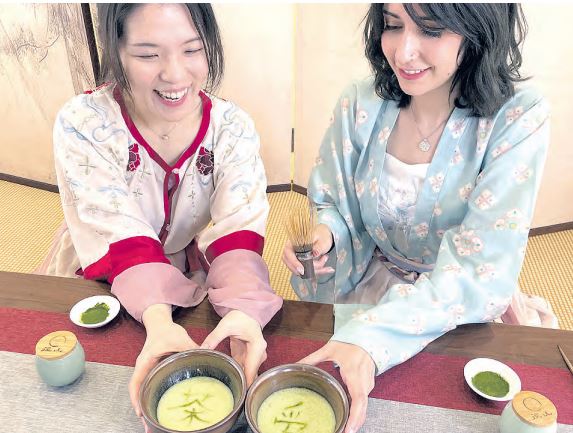
Before February 17, 2019, I was unfamiliar with the importance of green tea, but after my first trip to China, I came to understand the high value of this product by the Asian economic giant.
Over time, the global recognition of Chinese green tea has grown significantly as more people associate it with its delicate flavours, health benefits and cultural heritage.
One aspect many people who haven’t interacted closely with Chinese culture may not realise is the profound meaning behind gifting green tea.
If a Chinese person gives you green tea, it signifies that they value your friendship and the relationship between you.
In many cases, green tea is either gifted or served as a sign of respect and meaningful connection.
So, when your Chinese friend offers you this tea, there’s a deeper significance behind it.
Green tea in China has a history of more than 4,000 years.
Ancient records reveal it has been used both as a medicinal tonic and a refreshing beverage.
Tea is so integral to Chinese culture that the word ‘cha’ (Mandarin for tea) is not only a reference to the drink itself but also a symbol of hospitality, social rituals and daily life.
The historical and cultural connection between China and green tea is profound.
Many Chinese scholars have it that tea was ‘discovered’ in China over 4,000 years ago by Emperor Shen Nong in 2737 BCE, who, while boiling water, accidentally allowed tea leaves to fall into his pot, creating the first cup of tea.
Over time, tea evolved from a medicinal drink to an essential part of Chinese social rituals, literature and art.
Green tea is grown in Kenya and in many countries, but few countries endow it with the same cultural significance as in East Asia.
The many varieties of green tea are developed and savoured in China, Japan and Asian communities where tea connoisseurs are honoured.
For a typical Kenyan who is accustomed to sweetened beverages, the first encounter with green tea may be unpleasant due to its bitterness. Initially, you might question how people can drink unprocessed tea leaves.
However, as you become more conscious of its health benefits — especially today when people are increasingly aware of lifestyle diseases — you begin to appreciate green tea.
Its ability to replace sugary drinks and support weight management has contributed to its rise as a popular natural aid to a healthy lifestyle.
The production of Chinese green tea is an art form in itself.
Unlike black tea, which undergoes oxidation, green tea leaves are gently dried or steamed to preserve their natural antioxidants and vibrant green colour.
One of the main reasons behind the growing international demand for Chinese green tea is its many health benefits.
Packed with antioxidants such as polyphenols and catechins, green tea is praised for aiding in weight management, reducing inflammation and promoting cardiovascular health.
From personal experience, I would confirm that green tea helps in weight loss.
It takes time but one has to be patient to start witnessing the change.
As a typical Kenyan, in most cases, we do not want to wait for long.
We want to consume something today and expect change tomorrow, which is not the case when it comes to our bodies.
Research has shown that green tea enhances brain function.
This effect is attributed to its caffeine content, combined with the calming effects of an amino acid called L-theanine, which balances the stimulating effects of caffeine.
A 2013 study published in the American Journal of Clinical Nutrition revealed that regular consumption of green tea was linked to a reduced risk of heart disease and stroke.
Additionally, green tea’s anti-inflammatory and antioxidant properties support immunity and skin health and may help combat the effects of ageing and environmental stressors. However, it’s important to note that, despite all its benefits, Chinese green tea is not a cure-all.
Chinese green tea is more than just a drink; it embodies the rich cultural heritage of China, a tradition that has made its way into homes and hearts around the world.
The global spread of tea culture has been facilitated by China’s Belt and Road Initiative, which has helped strengthen cultural exchanges with regions across Africa, Europe and beyond. Tea acts as a cultural bridge, fostering relationships and facilitating dialogue between East and West.
In the West, tea-drinking customs have evolved to cater to local tastes.
For example, the classic English afternoon tea has incorporated Chinese green tea as a healthier alternative to traditional black tea.
Moreover, cafes and wellness establishments in the West are increasingly adding Chinese green tea to their menus, offering a range of options from matcha lattes to green tea smoothies.
These fusion adaptations reflect green tea’s versatility and its ability to cater to modern consumer preferences.
The future of Chinese green tea appears promising, with innovations in the industry such as new blends, increased focus on sustainability and its incorporation into wellness products.
These developments are expected to further fuel growth in both traditional and emerging markets.
Chinese green tea is more than just a beverage; it is a living tradition that has evolved over centuries, adapting to the changing tastes and needs of consumers worldwide.
From its origins as a medicinal remedy to its present status as a global wellness trend, green tea is a harmonious blend of history, health and modern innovation.











